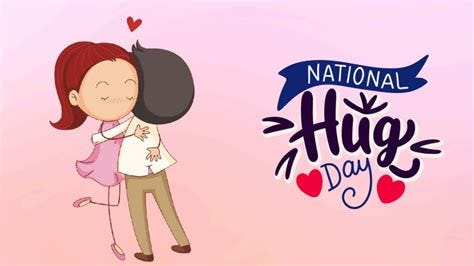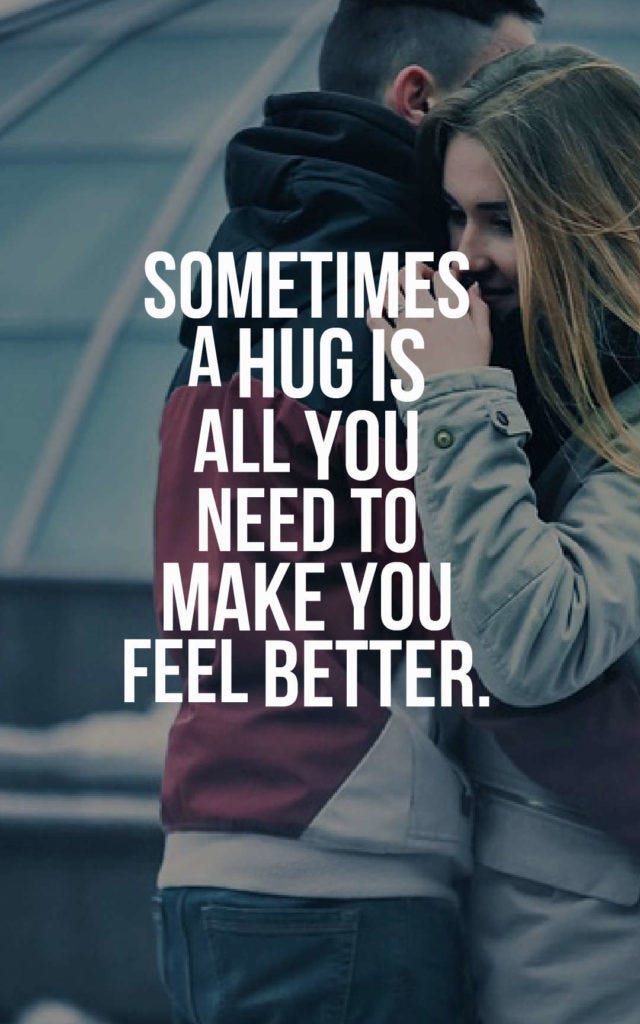I Just Need a Hug...
the human need for connection
It’s with a heavy heart that I write this, reflecting on the loss of a steadfast freedom fighter, and friend, Kevin Peters. Kevin was a rock for so many of us, standing strong in the face of adversity, a voice of reason and resilience in chaotic times. Yet, in his final moments, a week before Christmas, his parting words were simple and devastating: “I just need a hug.”
Those words echo in my mind. They’ve led me to deep reflection about what we’ve lost, not just Kevin, but a fundamental part of what it means to be human.
We are social beings. Human connection isn’t just a luxury; it’s a necessity. A hug, a handshake, a warm smile shared in person, while these seem like small gestures they carry immense power. They reassure us, ground us, and remind us that we’re not alone in this world.
But something has shifted. Out of fear, we’ve started isolating ourselves. Many of us have drawn lines, keeping loved ones, friends, and even strangers at arm’s length. Some of us fear the vaccinated; others fear the unvaccinated. Regardless of where we stand, this division isolates us. And in this isolation, we’ve unwittingly succumbed to the very forces we’re resisting.
The fear of “shedding” has created invisible barriers between us. We’ve allowed this fear to dictate our interactions, locking ourselves into isolated bubbles that resemble the 15-minute cities we’ve fought so hard to resist. We’ve traded one form of control for another, one that we’ve imposed on ourselves.
A New Kind of Isolation
The fear of “shedding” has created invisible barriers between us. But it’s not just that fear driving us apart. There are many fears contributing to this isolation:
Fear of contracting illnesses (e.g., COVID-19 or other viruses).
Fear of compromised immune systems (e.g., autoimmune diseases making individuals more cautious).
Fear of medical misinformation leading to mistrust in others’ health choices.
Fear of judgment due to differing beliefs (e.g., political ideologies, medical decisions, or environmental stances).
Fear of confrontation or conflict in polarized social environments.
Fear of being ostracized for personal choices (e.g., not following group norms).
Fear of surveillance or being monitored during gatherings.
Fear of digital overreach (e.g., QR codes, tracking apps tied to mandates).
Fear of sharing personal information unknowingly (e.g., health status or political views).
Fear of vulnerability and opening up emotionally after prolonged isolation.
Fear of rejection or being excluded from groups or communities.
Fear of facing unresolved trauma from past social interactions.
Fear of losing a job or income due to association with certain groups.
Fear of financial strain from traveling or participating in social activities.
Fear of climate-related risks (e.g., avoiding travel to reduce carbon footprints).
Fear of cultural differences and misunderstandings.
Fear of disrespecting religious or spiritual practices through unintentional actions.
Fear of physical safety in crowded or unfamiliar settings.
Fear of terrorism or violent protests at public gatherings.
Fear of losing control over one's carefully managed environment.
Fear of losing control over one's carefully managed environment
Fear of the unknown in a rapidly changing world.
Fear of deeper systemic control (e.g., Agenda 2030 narratives).
Fear of losing individuality in a push for collective goals.
feel free to add what fears you may be suffering with in the comments
These fears, whether rational or exaggerated, create walls between us, keeping us apart and deepening our sense of isolation.
The Global Context of Biodigital Convergence
This isolation ties into a larger narrative. The Canadian government’s Policy Horizons Canada has explored a concept called biodigital convergence, where biological and digital systems merge to change how we live, work, and even evolve as a species. According to Policy Horizons, this convergence isn’t just technological; it may transform how we understand ourselves, redefine what it means to be human, and reshape our relationships with nature and life itself.
The document highlights how biodigital convergence could profoundly impact our economy, ecosystems, and society, urging us to prepare for these changes while carefully managing their risks. This raises profound ethical and social considerations, guiding policy and governance discussions on plausible futures. But what happens when such a convergence, combined with fear and isolation, strips us of our humanity?
This global push aligns eerily with Agenda 2030’s goals, which emphasize reimagining every aspect of life under the guise of sustainability and progress. By isolating ourselves, we are unintentionally participating in a system that encourages disconnection and compliance. Slowly, we’re being nudged into a reality where human contact is limited, relationships are digitized, and control over our lives is increasingly centralized.
Kevin’s Legacy
Kevin’s story isn’t just about loss; it’s about what we can learn from that loss. His words, “I just need a hug”, are a plea for all of us to step back and reassess.
After all what is a hug?
Even AI has an answer for that:
A hug is a powerful and multifaceted gesture that conveys warmth, connection, and comfort.
Shall we break it down with AI
1. Emotional Connection
Affection and Love: A hug often expresses feelings of love and affection, whether between friends, family, or romantic partners.
Reassurance: It can be a way to show support, offering solace and understanding during tough times.
Celebration: Hugs can also signify joy, such as during reunions or moments of achievement.
2. Physical Sensation
Pressure and Warmth: The physical contact of a hug provides a sense of grounding through the gentle pressure and warmth of another person.
Oxytocin Release: Known as the "love hormone," oxytocin is released during a hug, fostering feelings of bonding, trust, and relaxation.
Reduced Stress: Hugging can lower levels of cortisol, the stress hormone, helping to calm the body and mind.
3. Non-Verbal Communication
Unspoken Words: A hug can say "I care," "I'm here for you," or "I missed you," without the need for words.
Comfort in Silence: Sometimes, a hug is the most appropriate response when words fail, especially in moments of grief or overwhelming emotion.
4. Social and Cultural Significance
Universal Gesture: While the meaning and appropriateness of hugs vary across cultures, they are often universally recognized as a sign of goodwill and connection.
Cultural Nuances: The duration, intensity, and frequency of hugs can differ by culture or social context, adding layers to their meaning.
5. Physiological Impact
Heart Rate Regulation: A hug can help slow the heart rate, promoting relaxation and a sense of safety.
Immune System Boost: Studies suggest that hugs can have a positive impact on the immune system, likely due to their stress-reducing effects.
6. Variations in Meaning
Different Types: From a brief, friendly pat to a long, heartfelt embrace, hugs can carry different levels of intimacy and meaning.
Situational Context: A hug at a wedding has a different energy than one offered at a funeral, reflecting the emotional tone of the moment.
7. Psychological Effects
Improved Mood: A hug can uplift spirits and combat feelings of loneliness or sadness.
Sense of Belonging: It reinforces social bonds, reminding individuals that they are valued and cared for.
In essence, a hug is a blend of physical, emotional, and psychological components that transcend simple touch, becoming a powerful tool for human connection and well-being.
So when AI knows this why don’t we?
feel free to add what a hug means to you in the comments
We need to remember that the fight for freedom isn’t just about policies, mandates, or borders. It’s about preserving our humanity.
Part of that humanity is the ability to reach out and hold one another, to offer comfort and support in the simplest yet most profound ways. We can’t let fear rob us of this basic need.
The Path Forward
We need to reclaim our connections. We need to break free from the isolation we’ve imposed on ourselves and find ways to gather, embrace, and rebuild trust. This doesn’t mean abandoning caution or discernment, but it does mean remembering what’s at stake: our humanity.
Solutions for Reconnection:
Freedom Fighters Anonymous: Create local support groups where like-minded individuals can meet, share, and support one another without judgment or fear. These groups can serve as safe spaces for emotional connection and solidarity.
Community Gatherings: Organize small, in-person events to foster connection—potlucks, hikes, or even book clubs.
Healing Practices: Incorporate practices like group meditation, communal singing, or storytelling to rebuild emotional bonds.
Education and Awareness: Host workshops to address and dismantle fears, encouraging open dialogue and understanding.
Hug Initiatives: Start “Hug Days” in your community, where people are encouraged to share this simple yet powerful gesture.
feel free to add your suggestions in the comments
Let’s not let fear win. Let’s choose to reach out, to hold each other close, to laugh together, cry together, and stand together. Let’s remember that freedom isn’t just about fighting against something; it’s about fighting for something, AND that something is our connection to each other.
In honor of Kevin Peters, let’s make a commitment: to hug more, to connect more, and to love more. Let his legacy be a reminder that even in the darkest times, the simplest gestures can bring light.
Hug someone today. You never know whose life you might save.
Biodigital Convergence https://horizons.service.canada.ca/en/2020/02/11/exploring-biodigital-convergence/index.shtml






Big Hug Connie and Friends! I'm A hugger and proud of it!
3 hugs heart-to-heart to all awesome subscribers